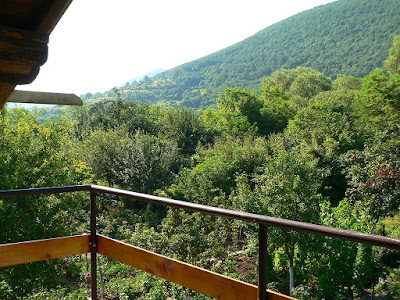SZ versus BG
 |
| The view from balcony of our villa in Kalotina, BG |
Why
is this blog called Bulgaria with Noodles?
Well, at moment we are here in Shenzhen (SZ) and then, next summer, we will be moving
back to Bulgaria. In the meantime, I bore to death all of my unfortunate colleagues
at Green Oasis School by telling them about that country in SE Europe. Although
physically I am still in southern China, my heart is in Bulgaria. As this is
now my fifth year in the Middle Kingdom, maybe you would like to read one or two points of comparison and contrast
between the two countries.
 |
| Noodles, at last! |
Firstly, food. I am sure that all of my Chinese friends would agree that food ought to come first. Chinese food is, well, okay. Eating out is cheap in China. I am writing this after having eaten lunch in the Green Oasis cafeteria. For a school lunch, it was not bad. Yes, there are some particularly annoying things about haute cuisine Chinoise, such as the strange concept that a chicken’s head, fat, bones and feet are just as tasty as the actual meat. Salt is just one of the not-so-healthy chemicals and additives that you may find hidden in the stuff that’s on your plate.
The strangest thing of all is that street food in China is often the yummiest, as well as being the freshest and cheapest too. They cook it right in front of you. The lady just round the corner from the bank (near to where I photographed the beggar) cooks these amazing pancakes, with lots of green bits, great sauce and peanuts. For a few RMB, you’ve bought yourself a filling lunch.
 |
| Olives in Sofia's covered market |
 |
| A breath of fresh air in Bulgaria |
Secondly,
air. Breathing is one of those things that you do not think about, but it might
be a bit of a problem when it goes wrong. (In much the same way, young people do not think about pensions because you are never going to be old and
then hey, before you know it, you are an OAP and yes, you really do need one.) Although
the air in Shenzhen is more or less okay, for a big city, sometimes the pollution is
bad. You can smell it, taste it. When the “haze” means you cannot see to the end
of the street, we will not let the children go outside at playtime at Green Oasis School. It has only happened a few times and it has something to do with the PM count, whatever that is. The good news is that the pollution level is quite low, most of the time, so I can walk to school each day.
In Bulgaria, the air in the mountains is sweet. Breathing is a pleasure. Each lungful is a delight.
In Bulgaria, the air in the mountains is sweet. Breathing is a pleasure. Each lungful is a delight.
 |
| A room without a view? |
Thirdly,
noise. Why do Chinese children (who are normally so adorably sweet) suddenly remember to do their violin practice at
10.30 pm? Then you have traffic noise from the streets and our dear neighbours
shouting at each other right next to our front door. (And why do Chinese front doors have the acoustic properties of a sheet of paper?) But at our villa in
Kalotina, the silence is deafening. It is just so quiet, noise-free, silent.
Fourthly, smells. China really does have some serious smells. Yes, there are 1.4 billion people in the Middle Kingdom and so the smells can be - well, pretty smelly. Then there are the awful whiffs that come up from the hole next to the washing machine. There seems to be something wrong with the drainage system in our apartment block, so sometimes the stench of sewage fills our flat. Yuck!
So do we like living in China? Yes, of course we do. We have some lovely friends here and we have had some great times together. Five years will be enough, but not more than enough.
Fourthly, smells. China really does have some serious smells. Yes, there are 1.4 billion people in the Middle Kingdom and so the smells can be - well, pretty smelly. Then there are the awful whiffs that come up from the hole next to the washing machine. There seems to be something wrong with the drainage system in our apartment block, so sometimes the stench of sewage fills our flat. Yuck!
So do we like living in China? Yes, of course we do. We have some lovely friends here and we have had some great times together. Five years will be enough, but not more than enough.



Comments
Post a Comment